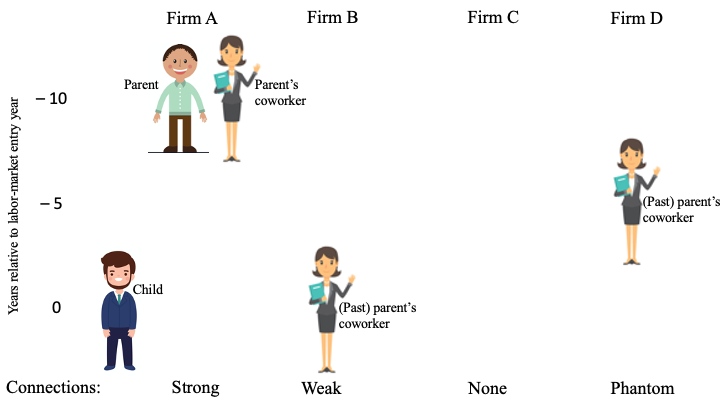
How helpful are socially connected parents for young workers’ who are entering the labor market? In my #JMP, I use administrative data from Israel to find out.
Website: sites.google.com/view/mulysan
#EconTwitter #EconJobMarket
A thread
1/9
Website: sites.google.com/view/mulysan
#EconTwitter #EconJobMarket
A thread
1/9

Social connections could help by
(1) Alleviating frictions by improving information flows about job openings
(2) Increasing the probability of a match, conditional on having information
I build a matching model to separately identify these mechanisms
2/
(1) Alleviating frictions by improving information flows about job openings
(2) Increasing the probability of a match, conditional on having information
I build a matching model to separately identify these mechanisms
2/
For identification, I compare: (a) firms where a young person has an existing parental contact during their labor-market entry year, with (b) firms where the young person *used to* have a parental contact but left shortly before their labor-market entry year
3/
3/

Data suggest parental links matter for young workers:
(1) workers are 3.7 times more likely to find employment in firms with (weak) parental connection than in otherwise similar firms
-->
4.1/
(1) workers are 3.7 times more likely to find employment in firms with (weak) parental connection than in otherwise similar firms
-->
4.1/
(2) workers' probability of starting at a particular firm discretely falls the year after their parental connection leaves to work somewhere else
4.2/
4.2/

I then build a model in which matching takes place in two steps:
(1) Workers and firms meet randomly
(2) Workers and firms who have met choose their optimal match
Both the probability of meeting and match utility can vary as a function of connections
5/
(1) Workers and firms meet randomly
(2) Workers and firms who have met choose their optimal match
Both the probability of meeting and match utility can vary as a function of connections
5/
I estimate the model using two distinct types of information: where do young entrants end up working, and how much they are paid
6/
6/

Model shows that both mechanisms are important. Parental connections increase:
(1) The meeting probability by 115%
(2) The likelihood of being hired by 35% (conditional on a meeting)
7/
(1) The meeting probability by 115%
(2) The likelihood of being hired by 35% (conditional on a meeting)
7/
Counterfactuals show that parental connections matter for inequality.
The wage gap between Arabs and Jews decreases by 12% when equalizing the groups' connections
-->
8.1/
The wage gap between Arabs and Jews decreases by 12% when equalizing the groups' connections
-->
8.1/
However, the gap Increases by 56% when prohibiting the hiring of connected workers.
These results are explained by the fact that Arabs rely more heavily on connections but have connections to lower-paying firms
8.2/
These results are explained by the fact that Arabs rely more heavily on connections but have connections to lower-paying firms
8.2/
The full paper is here:
mulysan.github.io/San_JMP.pdf
Thanks for reading! Any comments are much appreciated.
9/9
mulysan.github.io/San_JMP.pdf
Thanks for reading! Any comments are much appreciated.
9/9
• • •
Missing some Tweet in this thread? You can try to
force a refresh



